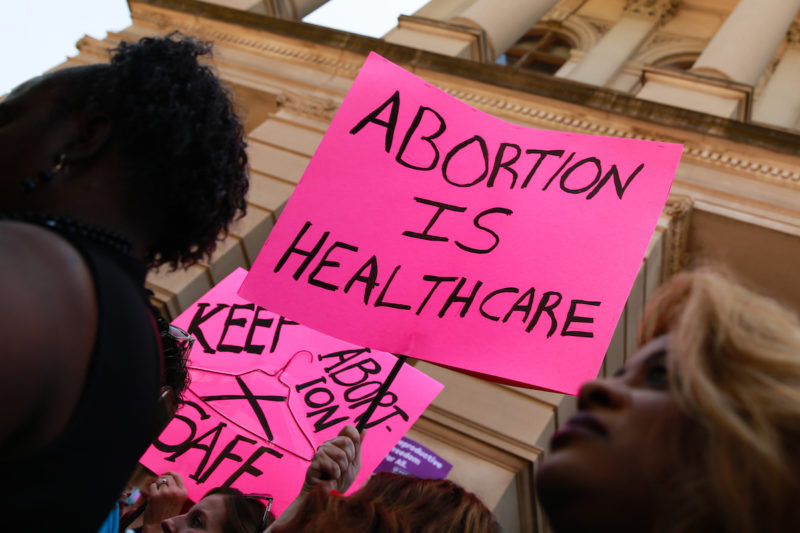Judge Blocks Georgia GOP’s Six-Week Ban: Abortion Law Is Not ‘Unsettled’
A federal court on Tuesday rejected arguments that a Georgia law didn't "ban" abortions before viability, but merely "restricted" them.

Georgia Republicans’ effort to outlaw abortion around six weeks into pregnancy was temporarily blocked by a federal judge Tuesday.
Georgia’s GOP-held legislature in the spring enacted one of the most extreme abortion bans in the United States. The draconian law would both ban abortion as soon as fetal cardiac activity can be detected in a pregnancy, which can be before many know they are pregnant, and establish fetal personhood.
District Judge Steven C. Jones rejected every one of the state’s arguments in defending HB 481, the Living Infants Fairness and Equality Act (LIFE). Signed into law in May by Gov. Brian Kemp (R), HB 481 bans abortion after a “fetal heartbeat” is detected and attempts to establish fetal “personhood” by asserting that it is the “policy of the State of Georgia to recognize unborn children as natural persons.” Advocates challenged the law in court in June, arguing it is a patently unconstitutional pre-viability ban, one that has the potential to cause particular harm to Black women and other women of color.
Attorneys for the State of Georgia defended the measure, claiming the law around whether states can ban viability before abortion is “unsettled.” They argued that the law was not a ban on abortion but merely a “regulation” since patients would still be able to have an abortion “up to the point” that a “heartbeat” is detected and HB 481 contains a narrow exception for “medical emergency, rape, or incest.”
“This is a victory for people in Georgia and a reminder that these attacks on abortion access are illegal,” Talcott Camp, deputy director of the American Civil Liberties Union’s Reproductive Freedom Project, said in a statement. “Abortion is still legal in all 50 states.”
Judge Jones’ 47-page decision rejecting the State of Georgia’s arguments is, frankly, unremarkable. It is a straightforward application of over 40 years of precedent that clearly establishes states cannot ban abortion before viability. It’s a sober rejection of attempts to create disagreement in the law around issues of fetal viability and state power where none exist. And for that reason, the opinion is a breath of fresh air.
“[T]he Supreme Court has repeatedly and unequivocally held that a State may not ban abortion prior to viability,” the opinion states. “By prohibiting abortions once a fetal heartbeat is detected, months before the point of viability, Section 4 of H.B. 481 does exactly that.”
Judge Jones rejected Georgia’s claims that HB 481 is anything other than an extreme and unconstitutional abortion ban.
“In the face of this clear Supreme Court precedent, established nearly a half-century ago in Roe and reaffirmed decades later in Casey and subsequent cases, the State Defendants insist that the law on this matter is ‘unsettled,’” Jones writes. “The Court, however, disagrees.”
That’s as much as Judge Jones says in response to Georgia’s claim that the law around when states can ban abortion is unsettled. It’s a powerful rebuke to basically disregard an argument, and that’s exactly what Jones’ opinion does.
“The State Defendants further insist that the Supreme Court has recognized the State’s interest in protecting the life of the unborn and that the ‘precise contours’ of that interest remain undefined. What is clearly defined, however, is that under no circumstances whatsoever may a State prohibit or ban abortions at any point prior to viability, no matter what interests the State asserts to support it.”
Georgia was one of seven states with Republican legislative majorities this year to pass some version of an extreme abortion ban designed to challenge the durability of Roe v. Wade and abortion rights. Not a single measure has yet to take effect, and that itself is a testament to the power of court precedent in protecting abortion rights. But the fact that anti-choice advocates continue to advance these measures with the hopes that one of them will be upheld is a testament to their belief that precedent can’t hold for much longer.
Attorneys for the State of Georgia are expected to appeal Tuesday’s decision to the conservative U.S. Circuit Court of Appeals for the 11th Circuit.
